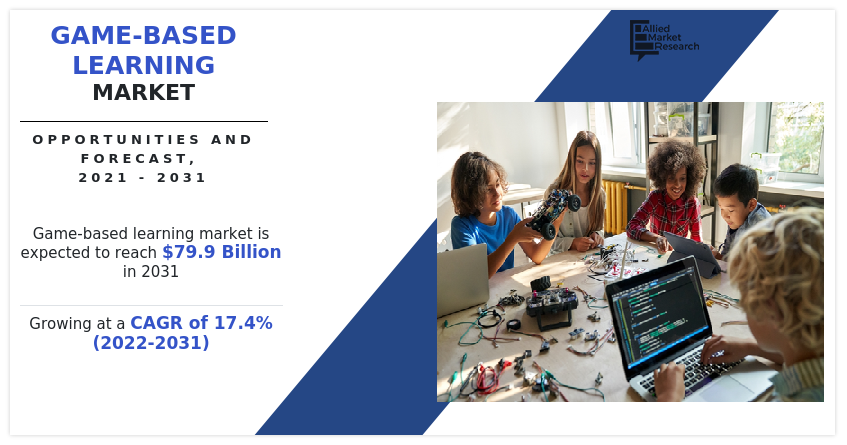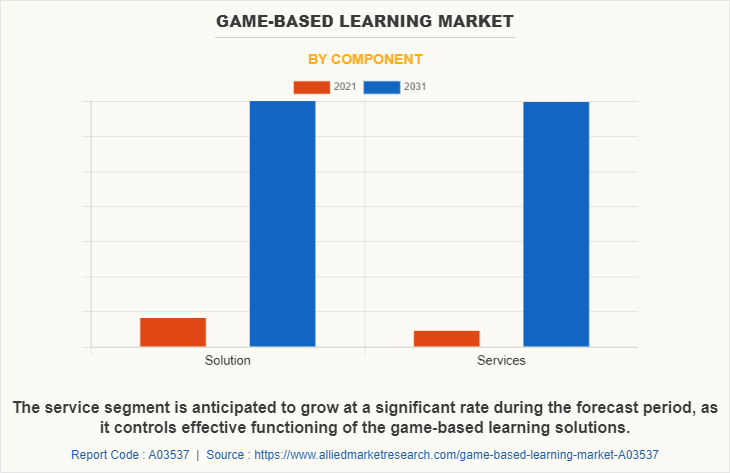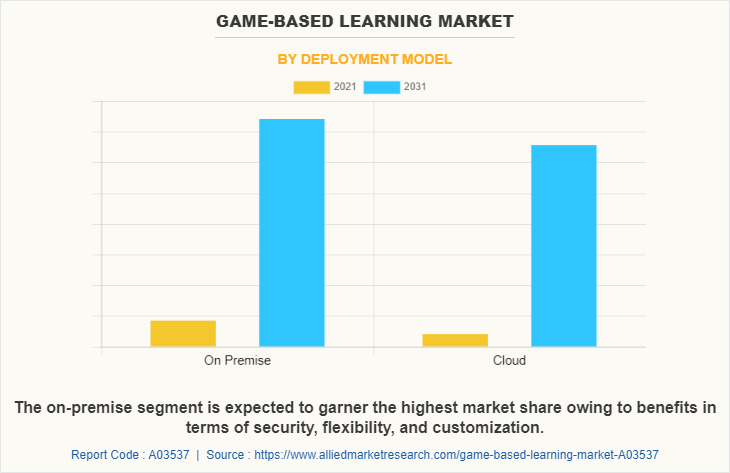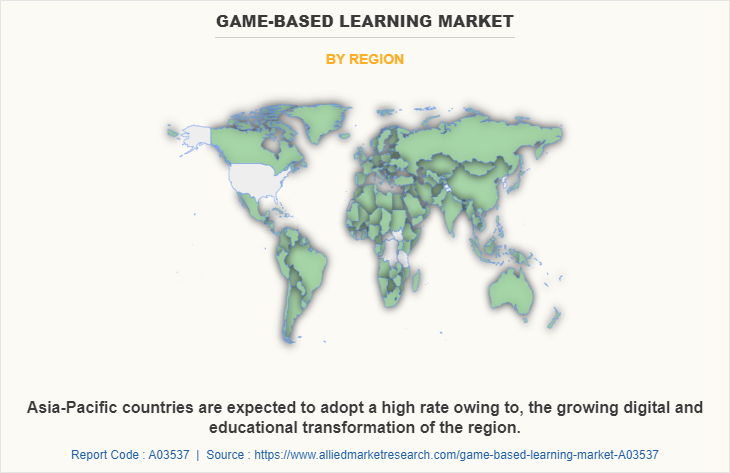Game-Based Learning Market Insights, 2031
The global game-based learning market was valued at USD 16.2 billion in 2021, and is projected to reach USD 79.9 billion by 2031, growing at a CAGR of 17.4% from 2022 to 2031.
Game based learning is a type of game play that has defined learning outcomes. Game based learning describes an approach to teaching, where students explore relevant aspect of games in a learning context designed by teachers. Teachers & students collaborate in order to add depth and perspective to the experience of playing the game. The core concept behind game-based learning is teaching through repetition, failure, and the accomplishment of goals. Students work toward a goal, choosing actions and experiencing the consequences of those actions. They actively learn and practice the right way to do things. The result is active learning instead of passive learning.

Game-based learning can be engaging and motivating through various dimensions of the designed game, which enhances the learning capabilities and process. Game-based learning helps improve memory, strategic thinking, and problem-solving, which improves hand-eye co-ordination and skills. Simulation and virtual gaming are emerging technologies in the game-based learning market.
Technological advancements in gaming sectors such as inclusion of artificial intelligence (AI), augmented reality (AR), and the release of 5G along with the emergence of unlimited data plans are some factors that drive the growth of game-based learning market. In addition, increase in smartphones and internet penetration globally drives the market growth.
For instance, according to Ericsson, the number of 5G mobile subscriptions in Asia-Pacific is anticipated to reach around 1,545 million by 2025. However, cost of implementation of games-based learning solutions is expected to hamper the growth of the market. Furthermore, the emergence of cloud deployment for games-based learning solutions is projected to provide ample growth opportunities for game-based learning market size growth.
The game-based learning market is segmented into Component, Deployment Model, Game Type and Industry Vertical. On the basis of component, the market is segmented into solution and services. According to the deployment, it is fragmented into on-premise and cloud. On the basis of game type, the market is segmented into AR VR games, AI based games, location-based games, assessment & evaluation games, training, knowledge & skill-based games, language learning games, and others. According to industry vertical, it is fragmented into consumer, education, government and enterprises. Region wise, it is analyzed across North America, Europe, Asia-Pacific, and LAMEA.
Some of the major players in the market are Cisco Systems Inc., Hurix Digital, Duolingo, StratBeans Consulting Pvt. Ltd., Learning Pool, Centrical, Cognitive Toybox Inc., ELM Learning, Gametize, G-cube, Allen Communication Learning Services, EI Design Pvt. Ltd., Filament Games, Learnbrite, Schell Games, Toolwire Spaces Learning and Performance Development Group.
On the basis of component, the solution segment dominated the Game-Based learning market share in 2021, and is expected to maintain its dominance during the forecast period. The increasing demand for quality education with a modern and interactive approach has led to an increase in the adoption of game-based learning techniques by various educational institutions. Moreover, the introduction of tablet and e-learning methodologies in schools around the world has boosted the global game-based learning market.
However, services segment registered highest growth rate during the Game-Based learning market forecast period. Over a period of time, increase has been witnessed in the adoption of game-based learning services among end users, as they ensure effective functioning of solutions and platforms throughout the learning process. Moreover, increase in adoption of cloud platforms is expected to boost the demand for game-based learning services.

By deployment, the on-premise segment dominated the growth in the Game-based learning market in 2021, and is expected to maintain its dominance during the forecast period. On-premises applications offer many benefits in terms of security, flexibility, and customization. These factors drive the growth of the on-premise game-based learning market. However, cloud segment registered highest growth rate during the forecast period. Cloud-based game learning software has low capital expenditure as well as low maintenance requirements and is, therefore, highly preferred by mid-sized financial institutions.

Region wise, the game-based learning industry was dominated by North America in 2021, and is expected to retain its position during the forecast period. This is attributed to number of factors such as adoption of game-based learning among teenagers, penetration of internet, and improvement in economy. In addition, presence of growing number of game-based learning vendors across the U.S. and Canada is expected to provide lucrative opportunities for the market.
However, Asia-Pacific is expected to witness significant growth during the forecast period, owing to wide presence of small-and medium-scale organizations, which are turning toward game-based learning solutions to efficiently manage their education system, particularly in developing countries such as China, India, and South Korea.

Top Impacting Factors:
Technological advancements in game-based learning
As technology progressed, the excitement and appeal of game-based learning only increased with more visual stimulus, creativity, and satisfaction. Moreover, the emergence of ever-evolving technology has made learning interactive, engaging, motivating, and handy. For instance, in July 2020, The Central Board of Secondary Education (CBSE) joined hands with Facebook, Inc., a U.S.-based online social media and social networking service company, to launch augmented reality, digital safety, and online safety prospectus in India.
Technological advancements such as augmented reality, virtual reality, and artificial intelligence have made education more interesting. The evolution of technologies has rapidly increased the adoption of game-based learning as they offer unique experience of learning along with gaming and provide immense satisfaction to the students. These benefits drive the game-based learning market growth.
Increase in smartphones and internet penetration
The increase in smartphone penetration and improved internet access in countries around the world continues to raise expectations for game-based learning system. High-end smartphones are now easily available thus resulting in a sharp increase in the number of mobile game-based learning applications. For instance, in August 2020, according to Appbrain, the most popular app category in the Google Play store was education, and there were around 276,869 apps available. In addition, more smartphone users, improvements in mobile internet infrastructure (5G network deployments), and mobile hardware contribute to the growth of the game-based learning industry.
Key Benefits for Stakeholders:
- This report provides a quantitative analysis of the market segments, current trends, estimations, and dynamics of the game-based learning market analysis from 2021 to 2031 to identify the prevailing game-based learning market opportunities.
- The market research is offered along with information related to key drivers, restraints, and opportunities.
- Porter's five forces analysis highlights the potency of buyers and suppliers to enable stakeholders make profit-oriented business decisions and strengthen their supplier-buyer network.
- In-depth analysis of the game-based learning market segmentation assists to determine the prevailing market opportunities.
- Major countries in each region are mapped according to their revenue contribution to the global game-based learningmarket.
- Market player positioning facilitates benchmarking and provides a clear understanding of the present position of the game-based learning market players.
- The report includes the analysis of the regional as well as global game-based learning market trends, key players, market segments, application areas, and market growth strategies.
Game-Based Learning Market Report Highlights
| Aspects | Details |
| By Component |
|
| By Deployment Model |
|
| By Game Type |
|
| By Industry Vertical |
|
| By Region |
|
| Key Market Players | Allen Communication Learning Services, Centrical, Learnbrite, Schell Games, Cisco Systems Inc., ELM Learning, StratBeans Consulting Pvt. Ltd., Toolwire Spaces Learning, Cognitive Toybox Inc., Gametize, Learning Pool, EI Design Pvt. Ltd., The Performance Development Group, Duolingo, G-cube, Filament Games, Hurix Digital |
Analyst Review
The global game-based learning market is projected to witness prominent growth, especially in Asia-Pacific and North America. This growth is attributed to increased investments by key players for game-based learning and adoption of cloud-based game learning systems. In addition, the adoption of IoT (Internet of Things) based devices globally and technological advancements such as augmented reality (AR) and virtual reality (VR) provide ample growth opportunities for game-based learning market.
Furthermore, factors such as increase in need for operational efficiency in education processes and rise in demand for data-driven teaching are expected to fuel the market growth. In addition, surge in adoption of cloud as well as mobile-based applications is expected to drive growth of the market. In addition, game-based learning has been significantly driven by the government’s focus on strengthening digital infrastructure, such as providing internet connectivity in the remote areas. For instance, in July 2022, as per data portal, a total of 5.03 billion people around the world use the internet, equivalent to 63.1 percent of the world’s total population.
Furthermore, according to industry experts, the game-based learning market is expected to witness increased adoption in the coming years, owing to digital transformation in education sector and rapid adoption of digital learning among various sectors.
The global game-based learning market was valued at $16,235.85 million in 2021, and is projected to reach $79,890.57 million by 2031
The game-based learning market is projected to grow at a compound annual growth rate of 17.4% from 2022 to 2031.
Some of the major players in the market are Cisco Systems Inc., Hurix Digital, Duolingo, StratBeans Consulting Pvt. Ltd., Learning Pool, Centrical, Cognitive Toybox Inc., ELM Learning, Gametize, G-cube, Allen Communication Learning Services, EI Design Pvt. Ltd., Filament Games, Learnbrite, Schell Games, Toolwire Spaces Learning and Performance Development Group.
North America region dominated the global market
Technological advancements in game-based learning such as inclusion of artificial intelligence (AI), augmented reality (AR), increase in smartphone & internet penetration, and surge in demand for game-based learning solutions are some factors that drive the growth of game-based learning market
Loading Table Of Content...



